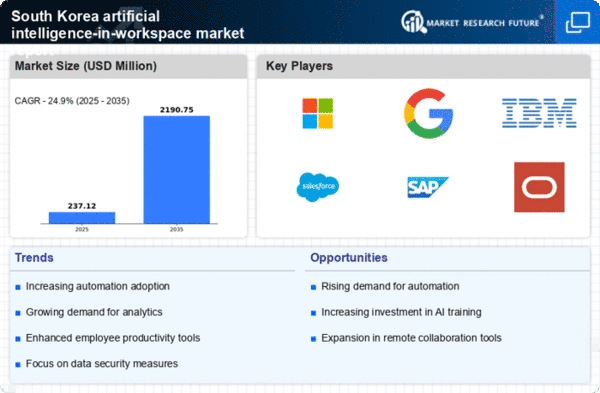Rising Demand for Efficiency
The artificial intelligence-in-workspace market is experiencing a notable surge in demand for efficiency across various sectors in South Korea. Organizations are increasingly adopting AI technologies to streamline operations, reduce costs, and enhance productivity. According to recent data, companies that integrate AI solutions report an average productivity increase of 30%. This trend is driven by the need to remain competitive in a rapidly evolving business landscape. As firms seek to optimize their workflows, the artificial intelligence-in-workspace market is likely to expand, with investments projected to reach $2 billion by 2026. This growing emphasis on efficiency is reshaping how businesses operate, making AI an essential component of modern work environments.
Technological Advancements in AI
Technological advancements in artificial intelligence are significantly influencing the artificial intelligence-in-workspace market. Innovations in machine learning, natural language processing, and robotics are enabling organizations to implement sophisticated AI solutions that enhance decision-making and automate routine tasks. In South Korea, the government has invested heavily in AI research and development, with funding exceeding $1 billion in recent years. This investment is fostering a robust ecosystem for AI startups and established companies alike, driving the adoption of AI tools in workplaces. As these technologies continue to evolve, they are expected to create new opportunities and challenges within the artificial intelligence-in-workspace market, potentially leading to a market growth rate of 25% annually.
Focus on Data-Driven Decision Making
The shift towards data-driven decision making is a critical driver of the artificial intelligence-in-workspace market. Organizations in South Korea are increasingly leveraging AI to analyze vast amounts of data, enabling them to make informed decisions that enhance operational efficiency. The ability to extract actionable insights from data is becoming paramount, with studies indicating that data-driven companies are 5 times more likely to make faster decisions than their competitors. This trend is prompting businesses to invest in AI analytics tools, which are projected to account for 40% of the total AI market share by 2027. As companies prioritize data-driven strategies, the artificial intelligence-in-workspace market is poised for substantial growth.
Regulatory Support for AI Integration
Regulatory support for AI integration is emerging as a significant driver in the artificial intelligence-in-workspace market. The South Korean government is actively promoting policies that encourage the adoption of AI technologies across various industries. Initiatives aimed at fostering innovation and ensuring ethical AI use are being implemented, which may enhance public trust in AI solutions. This supportive regulatory environment is likely to facilitate the growth of the artificial intelligence-in-workspace market, as businesses feel more confident in investing in AI technologies. With government backing, the market could see an increase in AI adoption rates, potentially reaching 60% of enterprises by 2028.
Growing Emphasis on Remote Work Solutions
The growing emphasis on remote work solutions is reshaping the artificial intelligence-in-workspace market. As organizations adapt to flexible work arrangements, there is an increasing need for AI-driven tools that support collaboration and communication among remote teams. In South Korea, surveys indicate that over 70% of companies are exploring AI solutions to enhance remote work capabilities. This trend is driving the development of AI applications that facilitate virtual meetings, project management, and team collaboration. As the demand for effective remote work solutions continues to rise, the artificial intelligence-in-workspace market is expected to expand, with projections suggesting a market value of $1.5 billion by 2025.
















